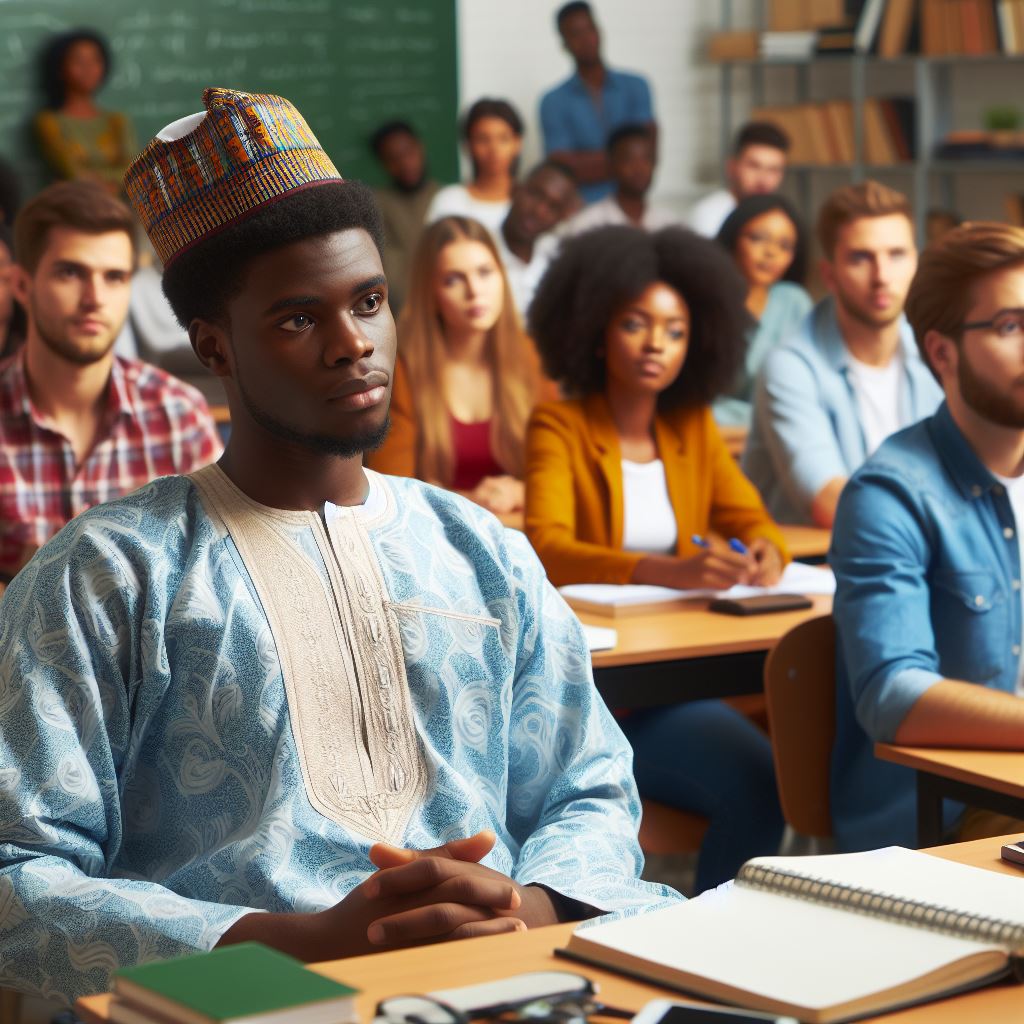Introduction
Anthropology Role in Preserving Nigerian Languages is the study of human cultures, societies, and behaviors. It plays a crucial role in understanding the diversity of human languages and traditions.
Preserving Nigerian languages is vital to maintaining cultural heritage and identity. Languages are a key aspect of a community’s history and unique identity.
Anthropology’s Contribution to Preserving Nigerian Languages
Anthropologists play a significant role in documenting, analyzing, and revitalizing endangered Nigerian languages.
Through fieldwork and research, anthropologists collaborate with local communities to record oral histories and document linguistic structures.
Anthropologists also work on language preservation projects, developing resources such as dictionaries and educational materials to promote language revitalization.
Understanding the Cultural Significance
Preserving Nigerian languages is essential for preserving cultural knowledge, traditions, and worldview that are embedded in the language.
Language is not just a means of communication but a repository of cultural heritage, values, and beliefs that must be safeguarded.
Promoting Linguistic Diversity
Anthropology emphasizes the importance of linguistic diversity and the need to protect endangered languages to maintain a rich cultural tapestry.
By raising awareness about the value of Nigerian languages, anthropologists advocate for policies that support linguistic preservation and revitalization efforts.
Anthropology’s role in preserving Nigerian languages is vital for safeguarding cultural heritage and promoting linguistic diversity. Through research and advocacy, anthropologists contribute to the preservation of Nigerian languages for future generations.
Overview of Nigerian languages
Nigeria is a country known for its diverse linguistic landscape, with over 500 languages spoken across its various regions. These languages belong to different language families, including the Niger-Congo, Afro-Asiatic, and Nilo-Saharan families.
Brief history of Nigeria’s linguistic diversity
The linguistic diversity of Nigeria can be traced back to centuries of migration, trade, and interactions among different ethnic groups. This diversity is also influenced by colonial history, as British colonization introduced English as a lingua franca.
Statistics on the number of languages spoken in Nigeria
- Over 500 languages are spoken in Nigeria.
- The three largest language groups are Niger-Congo, Afro-Asiatic, and Nilo-Saharan.
- Some of the most widely spoken indigenous languages include Yoruba, Hausa, and Igbo.
Importance of preserving indigenous languages in the face of globalization
Preserving indigenous languages in Nigeria is crucial for maintaining cultural heritage, fostering a sense of identity, and promoting diversity.
In the face of globalization and the dominance of major world languages like English, the preservation of Nigerian languages is essential for ensuring the survival of unique cultural practices, traditions, and knowledge systems.
Read: Scholarships for Communication Arts Students in Nigeria
Anthropological methods for language preservation
Anthropologists play a crucial role in preserving Nigerian languages through various methods tailored to each community’s needs.
How Anthropologists Study and Document Languages
- Fieldwork Techniques: Anthropologists immerse themselves in local communities to observe and record languages firsthand.
- Phonetic Analysis: They analyze sounds, tones, and pronunciation to accurately document linguistic nuances.
- Transcription and Translation: Anthropologists transcribe spoken languages into written form and translate texts for broader understanding.
- Documentation of Oral Traditions: They preserve oral folklore, myths, and stories, which often contain linguistic insights.
- Collaboration with Native Speakers: Working closely with native speakers ensures accurate language preservation.
Importance of Fieldwork in Preserving Endangered Languages
- Cultural Context: Fieldwork provides a deep understanding of the cultural context in which languages exist.
- Recording Endangered Dialects: Direct engagement allows anthropologists to record endangered dialects before they disappear.
- Revitalization Efforts: Fieldwork informs revitalization efforts by identifying language usage patterns and preferences.
- Community Engagement: Engaging with communities builds trust and encourages language preservation initiatives.
- Ethical Considerations: Fieldwork enables anthropologists to navigate ethical concerns and respect community wishes.
Collaboration with Local Communities and Linguists
- Community-Led Initiatives: Anthropologists collaborate with local communities to design and implement language preservation projects.
- Capacity Building: They train community members and linguists in language documentation techniques for sustainable preservation.
- Resource Sharing: Anthropologists facilitate the sharing of linguistic resources, such as dictionaries and teaching materials.
- Advocacy and Awareness: Collaboration raises awareness about the importance of language preservation among policymakers and the public.
- Long-Term Partnerships: Establishing long-term partnerships ensures ongoing support for language preservation efforts.
Anthropological methods, coupled with community engagement and collaboration, are essential for preserving Nigerian languages.
By documenting, revitalizing, and advocating for linguistic diversity, anthropologists contribute to the rich tapestry of Nigerian cultural heritage.
Read: Career Paths in Communication and Language Arts
Case studies of successful language preservation projects in Nigeria
Anthropology plays a crucial role in preserving Nigerian languages by conducting research, documenting languages, and working with communities to ensure their survival. Let’s explore some case studies of successful language preservation projects in Nigeria:
Examples of anthropological research leading to language preservation
One notable project is the work of Professor Mary E. Dakubu, a linguist who has dedicated her career to documenting and preserving Nigerian languages.
Through her research, she has published numerous dictionaries and grammar guides, ensuring that these languages are not lost to history.
Another example is the Living Tongues Institute for Endangered Languages, which has partnered with Nigerian communities to create comprehensive language documentation projects.
By recording conversations, songs, and stories in endangered languages, they are able to preserve these valuable cultural resources for future generations.
Impact of language preservation on cultural identity and community cohesion
Language is a fundamental aspect of cultural identity, shaping how we perceive the world and communicate with others.
By preserving Nigerian languages, anthropologists help communities maintain their unique heritage and traditions. This strengthens community cohesion and fosters a sense of belonging among its members.
Additionally, language preservation fosters intergenerational transmission of knowledge and values.
When children are able to learn their native language, they gain a deeper understanding of their cultural heritage and develop a stronger connection to their community. This contributes to a sense of pride and belonging that is essential for maintaining cultural identity.
Challenges faced in language preservation efforts
Despite the importance of language preservation, anthropologists face several challenges in their efforts to document and protect Nigerian languages.
One major obstacle is the rapid urbanization and globalization that is eroding traditional languages and customs. As younger generations gravitate towards more dominant languages, indigenous languages are at risk of extinction.
Furthermore, inadequate funding and resources hinder language preservation projects, making it difficult for anthropologists to carry out extensive research and documentation.
Without sufficient support, these projects struggle to reach all communities in need of language preservation assistance.
Additionally, political and social factors can pose barriers to language preservation efforts. In some cases, government policies favor dominant languages over indigenous ones, leading to a decline in the use of traditional languages.
Overcoming these obstacles requires advocacy and collaboration between anthropologists, communities, and policymakers.
Basically, anthropology has a vital role in preserving Nigerian languages, as it helps to document linguistic diversity, maintain cultural identity, and promote community cohesion.
By studying and protecting these languages, anthropologists contribute to a more inclusive and interconnected society that values the richness of linguistic diversity.
Read: Global Impact of African and Asian Studies Research

Anthropology’s role in promoting multilingualism in Nigeria
Anthropology plays a crucial role in the preservation of Nigerian languages, which are part of the country’s rich cultural heritage.
By studying the language and communication patterns of different ethnic groups, anthropologists contribute to the documentation and maintenance of linguistic diversity.
Importance of maintaining linguistic diversity in a multicultural society
Linguistic diversity is a key aspect of cultural identity and heritage. Each language represents a unique worldview, beliefs, and traditions that are passed down through generations.
Preserving languages is essential for maintaining cultural continuity and promoting intercultural understanding and respect within a diverse society like Nigeria.
Benefits of multilingualism for education, social cohesion, and economic development
Having a multilingual population provides various benefits in different areas. In education, preserving indigenous languages allows for more inclusive and effective learning environments for native speakers.
It also enhances cognitive development and critical thinking skills. Furthermore, multilingualism promotes social cohesion by fostering mutual respect and tolerance among different ethnic groups.
It creates a sense of unity and solidarity in a multicultural society like Nigeria. Economically, being multilingual can open up new opportunities for international trade, cultural exchange, and tourism.
Multilingual individuals are better equipped to communicate and negotiate in diverse settings, which can lead to increased economic growth and development.
Advocacy for government support and funding for language preservation programs
It is essential for the government to recognize the importance of preserving Nigerian languages and providing support for language preservation programs.
This can be done through funding research projects, establishing language learning centers, and integrating indigenous languages into the education system.
Government support is crucial in ensuring the survival and vitality of endangered languages and promoting multilingualism in Nigeria.
By investing in language preservation efforts, the government can help safeguard the country’s linguistic heritage and contribute to building a more inclusive and culturally rich society.
Most importantly, anthropology plays a vital role in promoting multilingualism in Nigeria by documenting and preserving the country’s diverse languages. Maintaining linguistic diversity is crucial for cultural preservation, education, social cohesion, and economic development.
It is imperative for the government to support language preservation programs to ensure the continued existence of Nigerian languages and promote a more inclusive and culturally rich society.
Read: Language Learning in African and Asian Studies
Impact of globalisation on Nigerian languages
The accelerated process of globalisation has had a profound effect on Nigerian languages, threatening their survival. As dominant languages and cultural influences spread worldwide, local languages are often marginalised and even endangered.
The threat posed by dominant languages and cultural influences
English, as the official language of Nigeria, and other dominant languages like French, are increasingly favoured in educational and professional settings.
This preference leads to a decline in the everyday use of indigenous languages, pushing them to the periphery of society.
Role of anthropology in raising awareness about the importance of indigenous languages
Anthropologists play a crucial role in highlighting the value of Nigerian languages through research and advocacy.
By studying the cultural significance of language and its connection to identity, anthropologists raise awareness about the rich linguistic heritage of Nigeria.
Importance of language revitalisation efforts in preserving Nigerian cultural heritage
Efforts to revitalise Nigerian languages are essential for preserving the country’s cultural heritage. Language revitalisation programs focus on teaching and promoting indigenous languages in schools, communities, and media platforms.
These initiatives empower Nigerians to reclaim their linguistic roots and celebrate their cultural diversity.
Conclusion
Anthropology plays a crucial role in preserving Nigerian languages. It documents languages, ensuring they remain vibrant and accessible.
This preservation is vital for cultural diversity and heritage. Nigerian languages encapsulate histories, traditions, and identities.
Without them, invaluable cultural knowledge could be lost forever. Individuals must actively use and teach these languages.
Communities should organize language workshops and cultural events.
Policymakers need to implement educational policies supporting multilingual education and funding for language preservation projects.
By working together, we can safeguard these languages for future generations.
Language is not just a communication tool; it is the essence of cultural identity. Preserving Nigerian languages enriches the nation’s cultural mosaic.
It promotes mutual respect and understanding among diverse groups.
Let’s commit to protecting and promoting Nigerian languages. Our collective efforts will ensure that Nigeria’s linguistic heritage remains vibrant and celebrated.
Join the movement to preserve our linguistic heritage today.




